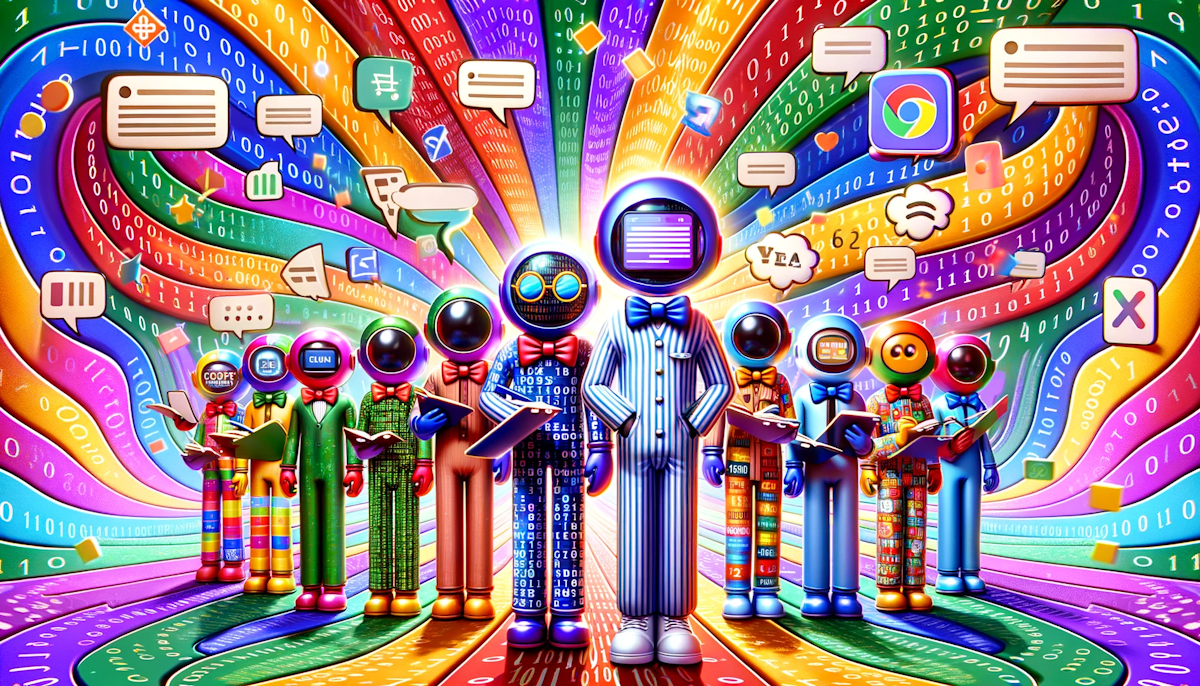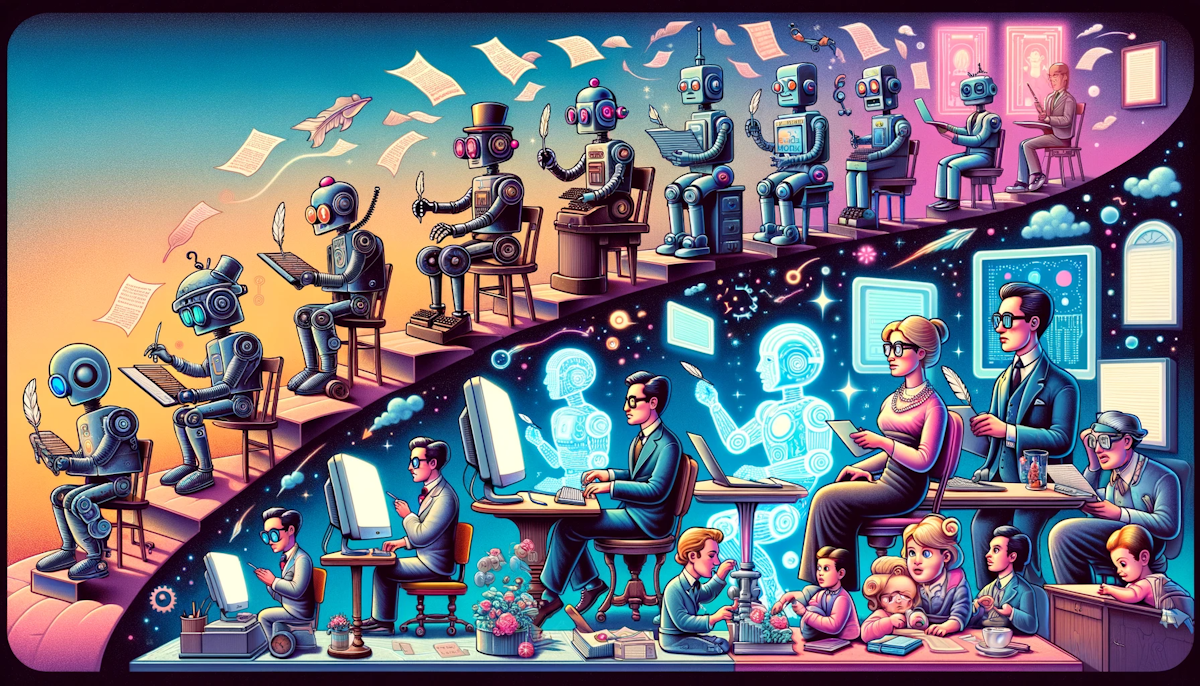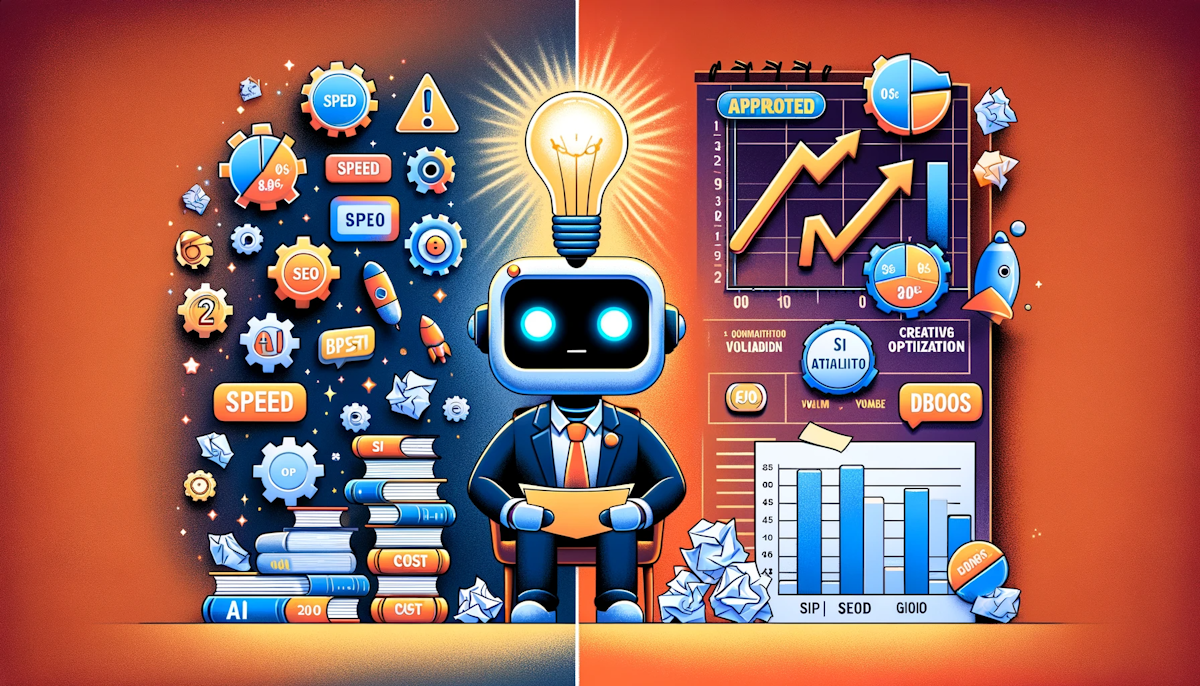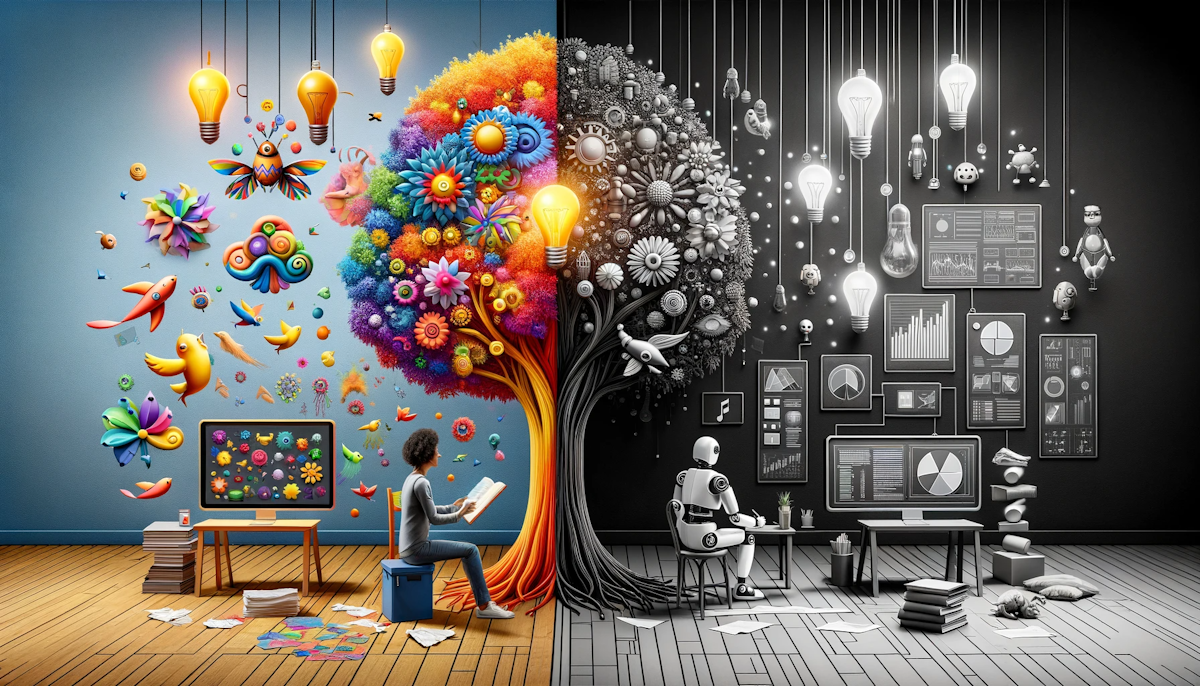Maximizing Your Content Potential: Are AI Content Writers Worth the Investment? And 10 Must-Have Tools

AI has brought about an evolution in the sphere of content production. It is certainly appealing that one can produce high-quality content in huge amounts within a short time. However, the biggest query arising over here is whether there is an actual financial value to investing in AI content writers.
Today’s post will look at the change that has occurred, considering ROI, and evaluating the benefits versus the risks. In going deep into the core of this issue, we get to examine the best 10 AI content generation tools that are transforming how content is made. Join us while we unleash the power of AI to revolutionize content creation.
Artificial intelligence and content creation
With AI entering the field of content production, we are witnessing the most momentous change in how we both generate and interact with scripted material. This is where we begin by tracing back the developmental processes that led to the creation of these content writers, as well as looking at the improvements made in NLP technology over the years that have culminated in the current status.
A Brief History of AI Content Writers

Although AI-generated content may seem contemporary, it started in the mid-20th century. The first AI systems that could produce simple text and translation emerged in early AI development. In the 1990s, for example, rule-based systems were introduced, which enabled the automated production of particular types of texts.
Nevertheless, it is only in the past ten years that the true power of AI content writers has become apparent. Models such as OpenAI’s GPT (Generative Pre-trained Transformer) raised a debate about AI generating human-like texts. They include chatbots and content marketing strategies, among others, all of which are becoming popular content application models.
Advances in Natural Language Processing (NLP)
The field of artificial intelligence, more specifically natural language processing, has propelled this content generation in AI. In recent times, the advances in deep learning and neural networks have caused a renewal of NLP. This is what supports the AI content writer in analyzing, interpreting, and producing text with contextual meaning and continuity.
Pre-trained models such as GPT-3 have transformed the understanding of NLP. These models are built on large amounts of data, providing them with knowledge of grammar, meaning, and even subtleties in language. The result is that they produce content that is most often more consistent and has a higher quantity than human writing.
The emergence of AI in content development illustrates how far the field of NLP has advanced!
Advantages and Disadvantages of Using AI Content Writers

The emergence and explosion of AI writers have transformed the way the world develops content. However, despite all these benefits, multimedia learning is not perfect. The importance of the pros and cons of AI in content creation will be looked at in this section.
Advantages of AI-Generated Content
Efficiency and Scalability
The efficiency of AI-created text is undoubtedly one of the most notable benefits. AI produces tons of text in less than an hour; that’s how fast an AI writer is compared to a human one. With AI technology, one can obtain such content as bulk product descriptions, social media posts, and data-driven reports in large volumes with ease and at a pace that is humanly impossible to compete with.
Scalability is another asset. AI can easily scale up to satisfy the growing supply of content needs. In this regard, AI becomes vital to businesses that want to expand into the digital landscape, communicate with customers, and keep a uniformity of messages through divergent channels.
Consistency and Quality
The biggest advantage of using AI writers is that they deliver high-quality and consistent results. They follow grammar and style strictly, making sure all the content is consistent in tone and formatting. It is of great importance, especially in brand communication, since this helps to uphold your identity and message across any channel that you use.
Additionally, AI-generated content does not have typographic errors that sometimes slip through a human writer’s fingers while checking and correcting. This results in clean and error-free content that connects to your target audience.
Time and Cost Savings
In the global economy that deals with creating content, time is valuable. Writers, marketers, and businesses can save much time through such AI actions as making first text drafts, editing pre-written content, and so on. Given this, efficiency equals lowering content creation costs as less time is spent on creating content.
Businesses that have low budgets should utilize AI-generated content to ensure their business competence in the digital marketplace is effective.
Challenges and Limitations

Lack of Creativity
However, AI is excellent at coming up with content based on information already available and setting trends, but it fails to exhibit the creativity and innovation associated with human writers. Content generated by AI is often unoriginal because it tends to conform to prescribed rules and patterns of operation.
However, creative writing involving stories, poems, or personal and intensive narrative continues to be a sphere where an incomparable advantage is on the side of human writers. However, AI-generated content is often perceived as monotonous and tedious.
Ethical Considerations
There is an ongoing debate as to whether it is ethical or unethical to use AI to create content. Therefore, concerns surrounding artificial intelligence, openness, and informing the audience need special attention. Moreover, AI-generated content may be used with malicious intentions, like fake news or fraudulent information, hence the need for ethics and responsible AI use.
Vigilance is necessary when dealing with ethical AI content writers because AI has to be utilized for good.
Potential for plagiarism
This is achieved through learning from large datasets and already existing content. As such, there is every possibility of unwitting plagiarism. AI can produce text similar to content authored by others. This calls into question the matter of authenticity and copyright infringement.
AI-generated content should always be subjected to verification and review to confirm that it has not been copied elsewhere. This limitation calls for human oversight and the use of plagiarism detection tools.
However, the implementation of AI content writers does not end with one particular sector alone. This part will explain how AI content writers influence particular sectors and their economic significance.
The Benefits of Using Artificial Intelligence in Writing and Specific Focus Areas

E-commerce
These content-writing tools have taken center stage in what is arguably the most active marketplace of all, the e-commerce sector. They do very well when it comes to producing product descriptions, user reviews, and customized shopping advice.
This improves sales by making the shopping experience interactive through the creation of meaningful yet enjoyable content via AI, which ultimately leads to increased conversions. With such product descriptions driven by AI, they can be personalized to specific customers’ preferences, highlighting those attributes of interest to any given shopper. A content writer provides an upper hand to e-commerce entities to entice and retain clients in a competitive business sphere.
Healthcare
Up-to-date and accurate information is crucial in the healthcare industry. Through this approach, AI content writers are in a position to produce healthcare articles, educational materials for patients, and research summaries rapidly.
In this regard, it’s of great importance to give people an opportunity to spread the word about their medical situations, the kinds of therapy they may follow, or general guidelines on how to stay healthy.
AI content writers can be used by healthcare providers and entities to improve patient education, build health literacy, and make medical information easily available.
Journalism
The presence of AI content writers has been felt in journalism due to the high need for quality and speedy information delivery. The utility of these tools is that they can write about different topics as news articles and reports or merely summarize information.
AI content writers give journalists prepped material in terms of data, facts, and rough drafts, which may later be improved on by human reporters.
In this way, AI helps journalism by taking away simple duties that allow journalists to venture into deep research and analysis, thereby enhancing the content of journalism.
The use of AI content writers in these as well as other industries demonstrates their versatility and ability to improve content generation. The advantages gained by businesses and organizations embracing AI include enhanced efficiency, engagement, and current and useful content delivery to their audiences.
Are AI Content Writers Worth the Investment?

For businesses and content creators, it’s a big question if AI content writers are worthy of such an investment. The section above also considers vital factors for evaluating ROI and how AI influences content creation.
Assessing the Performance of AI Content Writers
Assessing whether the ROI of an artificial intelligence (AI) content writer is greater than the initial investment requires comparing the advantages and disadvantages. To assess ROI effectively, consider the following factors:
Content Volume and Speed: AI content writers are highly efficient at producing massive amounts of content within a short period of time. To maximize the return on investment when you need more time-sensitive and extensive content, AI can take less time and resources for the creation of content.
Cost Savings: The use of AI in content creation aims at reducing the costs of repetitive processes and minimizing the size of the writing team, hence saving money. Estimate the savings on labor costs due to AI content creation.
Efficiency in Marketing: In addition, AI will help improve marketing through compelling ad copies, product descriptions, or well-written emails. Better marketing materials increase conversions of visitors, which translates into higher revenues, leading to increased positive returns on investment (ROI).
SEO Benefits: Top-notch SEO-enhanced AI article writing improves your online presence. Increased organic traffic and conversions are a result of enhanced SEO, which further affects the ROI score.
Data-Driven Insights: AI analyzes huge data sets to reveal content performance, audience engagement, and trends. From these insights, an organization or business can formulate its content strategy for increased return on investment based on targeting the best possible audience.
Balancing Human and AI Content Creation
While AI can certainly contribute to creating content, it does not mean replacing human writers altogether. To achieve a balanced approach:
Enable partnerships between AI writing utilities and human authors. Although artificial intelligence may produce the first drafts or statistics-based reports, human authors can inject creativity, specialized knowledge, and individuality into the text.
Implement robust quality control measures. As such, it will be imperative to institute human supervision to ensure that the content is true to the brand voice, authentic, and error-free. Improve quality by reviewing and editing AI-generated content.
Create a content plan for incorporating AI into the content production procedure at defined times. Set up a policy on what AI can help to achieve best, for example, in large-scale content creation or data-driven reports.
Ensuring Quality and Authenticity
Ensuring that AI-generated content is of high, real quality requires care. To ensure the content aligns with your brand identity and resonates with your audience:
Add human reviewers of editors who will go through and improve on AI-created content. This also makes it possible for them to personalize something, address particular issues, and make sure that what is written meets your high-quality requirements.
Personalize AI-produced content to match your specific brand language and tone. Adjust the output to your particular objectives and aims.
Obeying ethical principles when creating the content with AI is very important especially by letting your readers know that you are using AI-created material. And above all, stick to good ethics and do not cheat them by lying about the content you wrote.
Must-Have AI Content Generation Tools
OpenAI's GPT-3: This is attributed to GPT-3’s natural language generation capacity. It can create meaningful and appropriate text for various content requirements, like articles, blogs, and chatbots. The power of GPT-3 relies on its large data set, understanding natural language, and learning how to talk like people.
ChatGPT: ChatGPT is a sibling model of GPT-3 adapted for online chats. It is one of the best producers of conversational content that can be suitable for a chat box, virtual assistant, and other human-like conversations.
ContentBot: It can be said that ContentBot is a functional tool for the artificial intelligence generation of content. It can be used to develop content for several channels, such as blogs, social media postings, product descriptions, etc. This flexibility makes ContentBot more effective at creating content for different usage occasions.
Typli: Typli is a platform for content creation focusing exclusively on producing text that resembles that produced by humans. Designed for article write-ups and posts, among others. Uniquely, Typli is focused on producing content as close to human writing as possible.
Copy.ai is a tool that can be used to create different kinds of marketing copy along with product descriptions and other forms of content. The software is useful for companies that want to simplify their marketing process because it gives them a compelling copy for advertisements, sites, and product descriptions.
Writesonic: Writesonic provides AI-created content for blogs, ads, emails, and so on. It offers templates and cues that assist in the creation of content, which makes it a useful resource for content marketers and writers.
Conversion.ai: The software targets writing advertising, email, and copywriting content for the websites. human written With high-converting content, it assists businesses in improving their marketing endeavors.
Snazzy ai: Snazzy AI specializes in writing on blogs, social media, and in advertisements. Businesses that want to make interesting content on social media should buy it; it’s quite good for them.
ShortlyAI: Writing short articles using artificial intelligence provided by ShortAI It is flexible and could be tailored to cover different kinds of content needs, making it an important tool for content creators.
SurferSEO: However, SurferSEO is popularly known as a tool for optimizing content, and it comes up with AI-generated suggestions designed to enhance the SEO quality of an article. In addition, it assists in helping content creators improve their content, thereby boosting search engine visibility.
Realizing the potential
The potential that AI content writers have to change how we prepare content is immense. It is therefore important to grasp how to capture its value addition, manage difficulties, and adhere to moral principles. In this section, we identify important considerations when employing artificial intelligence copywriters, utilizing AI across various writing scenarios, and the ethics behind creating AI-generated material.
How to Successfully Use AI Content Writers
To make the most of AI content writers, consider the following tips:
Assess your needs and objectives. Start by stating your content goals. Find out where AI will work best within your content generation cycle—for example, in writing blog posts, social media content, and/or marketing copy.
Selecting the Right AI Tools: Select a suitable AI content creation tool for your particular needs. Take into account such aspects as content volumes, their quality, and some distinct particularities the tools have.
Workflow Integration and Collaboration: Use AI as it allows you to integrate smoothly into your content creation activities. Promote cooperation between AI and human scribes, resulting in the seamless blending of AI-created and written content to enhance the quality of work.
Utilizing AI and Diverse Content Needs
AI Content Writers Can Serve a Wide Range of Content Needs, Including:
Bulk Content Production: Generate large volumes of content rapidly and easily using AI, primarily concerning recurrent jobs such as writing about products or posting on social networks.
Content Enhancement: Optimizing Content Using AI Technology to Help Improve Existing Content Artificial intelligence (AI) can assess the quality, SEO potential, and ease of understanding of your content.
Marketing and Sales Copy: Use AI to craft catchy copy and headlines for ads and emails. Increased conversion and effectiveness in your marketing activities can be enhanced by applying AI tools.
Data-Driven Reports: Use AI to develop data-oriented dashboards, abstracts, and inferences. This allows AI to sift through large quantities of data from different sectors, like banking and healthcare, and yield vital information.
Ethical Considerations and Best Practices
As you embrace AI content writers, it's crucial to uphold ethical standards
Transparency: Reveal that you have used AI-generated content where it is appropriate to do so. The use of transparency allows you to create an atmosphere of trust amongst your audiences toward the role played by AI in content writing.
Ethical Use of AI-Generated Text: AI should be guided by ethical principles and avoid practices like copying, issuing propaganda, or misleading the readers.
Human Review and Editing: Have a human review of content produced by an AI. This step allows quality measures, realness or authenticity checks, and compatibility to ensure the content is in line with the brand image you intend to pass on.
Continuous Learning: Be abreast of all things AI and content creation. The development of AI technology is rapid, and being knowledgeable about the current AI trends and available software allows for taking maximum advantage of the benefits that it offers.
Conclusion
In sum, there is no doubt that AI has established its niche among content generators and may continue to dominate in future explorations. As a result, AI content writers have an important position, contributing notably to issues such as turbocharging efficiency, preserving quality, and creating consistency throughout a project.
However, this revolution carries moral and aesthetic concerns, just as we recognize the importance of human factors in innovation and creative endeavors.

Daniel Errante
Lead Software Engineer, Typli.ai
Daniel is a software engineer, entrepreneur and AI enthusiast who has a passion for writing great software and coaching software development teams on how to build reliable, scalable and secure software. Over the past few years he has developed an interest in building artificial intelligence applications and is the head software engineer at Typli.ai.
Don't let complicated software hold you back. Step into effortless content creation with Typli and elevate your writing today. Experience AI content writing made simple.